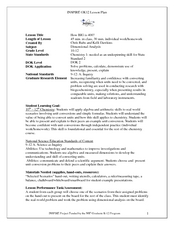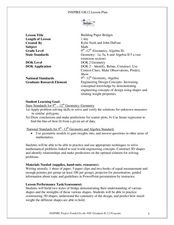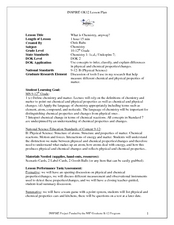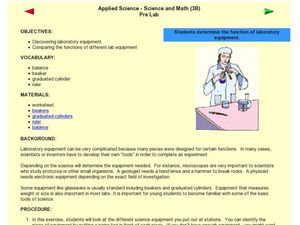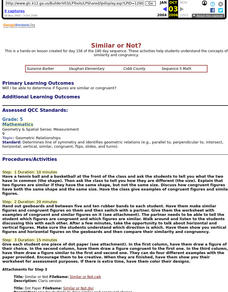Curated OER
How BIG is 400?
Students solve problems using dimensional analysis. In this chemistry lesson, students choose a problem and present it in class. The rest of the class will evaluate the solved problem on the board.
Curated OER
Solar System Distance Activity
Students examine the distances between the Sun, planets, and smaller objects in the Solar System. They design a model using beads that shows the scale distances of the Solar System using astronomical units converted into a 10 centimeter...
Curated OER
Earth Science Lesson Plans - The Hadean
Fourth graders review the Clock of Eras and learn about The Hadean. In this eras lesson, 4th graders study the characteristics of the first time period on the Clock of Eras; The Hadean. They watch a demonstration of a volcano model.
Curated OER
Air Pressure is Powerful
Students construct a barometer and collect data on the changes in air pressure. They work is small groups using plastic tubing, corks, and green food coloring. They then use a formula to convert inches of mercury to barometric pressure...
Curated OER
The X-33 and the X-38
Students explore the relationships among the lengths, areas, and volumes of similar solids. They also discover what effect doubling the dimensions of a figure has on the resulting area.
Curated OER
Grating Spectrometer
Students calculate the Balmer series. In this physics lesson, students observe hydrogen lamp spectra using spectrometers. They calculate wavelength and compare them with their theoretical calculations.
Curated OER
Geometric Figures
Students compare, classify and calculate the area of geometric figures such as rectangles, squares, circles and triangles.
Curated OER
Does Contact Area Matter?
Young scholars work together to design and implement an experiment on friction. They test to see if contact area affects the amount of friction. They discover how engineers use friction to make certain products better.
Curated OER
Searching the Attic
Pupils investigate an attic or basement to "discover" family artifacts. They develop a grid map using string, create a naming system for the grid, and analyze items of interest.
Curated OER
Artistic Angles
Fifth graders explore angles by using protractors. They recognize, describe and determine the surface area and volume of three-dimensional shapes. Students recognize the right angle, acute angle, obtuse angle and vertex. They identify...
Curated OER
Golden Ratio of the Human Body
High schoolers calculate the ratio of the height of the body to the height of the navel. They discover that the ratios are all approximately equal.
Curated OER
GPS Receiver Basics
Students practice using a GPS receiver. They walk in different directions and monitor their progress on maps. They enter specific locations and use information given to them to get them back to their original locations.
Curated OER
State Your Position
Students practice using a global positioning system. They discuss the use of celestial objects as navigation points and its problems. They list the advantages and disadvantages of GPS as well.
Curated OER
Testing the Hypothesis
Students create and conduct various experiments to determine the origin of a family artifact, and then determine whether their results were successful. Students summarize their results and evaluate whether their hypotheses were correct.
Curated OER
Sediment Tubes
Learners observe how different density soils and rocks behave in wind and in water. They make predictions and careful observations as they explore sediment transport and sediment rates in streams and rivers.
Curated OER
Building Paper Bridges
High schoolers construct a bridge that can hold 100 pennies. In this math lesson, students evaluate the strength of their bridges. They predict how much weight a bridge can hold based on its design.
Curated OER
A Funny Thing Happened on the Way to the Mill
Students participate in a simulation of wool trading in the 1800's. They pass around a ball of yarn at various stations to simulate the interdependence of each stage of the wool trade, discuss what happens when there is a problem in the...
Curated OER
A Proper Role for Government - Seeking Perfection in an Imperfect World
Students discuss the proper role of government in the economy. Reviewing the foundations for a market economy to work properly, they decide how to best direct resources to get the most out of them. They distinguish between private and...
Curated OER
What Is Chemistry, Anyway?
Students differentiate physical and chemical change. For this chemistry lesson, students list examples of those changes. They apply what they learned in a Jeopardy style team game.
Curated OER
Applied Science -- Science and Math (3B) Pre Lab
Set up stations around your science lab to introduce youngsters to different equipment. They examine a beaker, graduated cylinder, ruler, balance, and thermometer. The said worksheet is not included, but you will find a few useful tips...
Curated OER
Similar or Not?
Fifth graders define the meaning of similar and congruent using concrete objects. They make similar and congruent figures using geoboards. They draw their figures on dot paper, and color their designs.
Curated OER
Using Computer for Statistical Analysis
Students examine the use for spreadsheets in analyzing data. They make spreadsheets that display and calculate a given data set such as temperature change.
Curated OER
Fishkill
Students analyze data to determine the effect of thermal pollution on a certain species of fish. They graph temperature and dissolved oxygen and make inferences on the impact a change in temperature could have on the fish. As a class...
Curated OER
Hardwood Veneer
Students explore uses of hardwood veneer and the manufacturing process. They view veneer samples and work in groups to answer questions about the process of making veneer. After touring the school to create a list of products made with...


